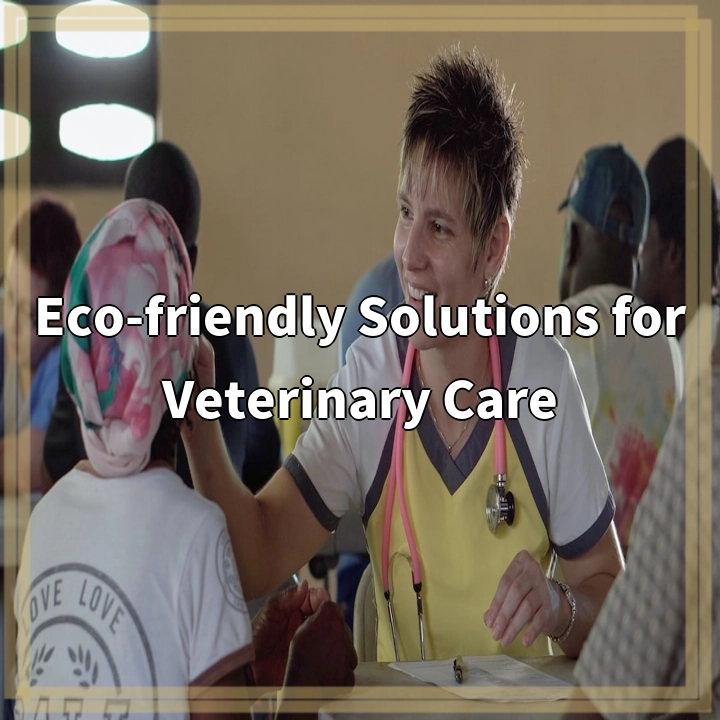
What are Eco-friendly Solutions for Veterinary Care?
Eco-friendly solutions for veterinary care refer to practices and approaches within the field of veterinary medicine that prioritize environmental sustainability and minimize negative impacts on the ecosystem. These solutions aim to reduce the carbon footprint, waste production, and chemical usage associated with veterinary practices, while still maintaining high standards of animal healthcare.
Real-World Problems Associated with Veterinary Care
Veterinary care, like any other healthcare sector, has its own set of environmental challenges. Some of the real-world problems associated with traditional veterinary practices include:
1. Waste Generation
In the course of providing medical care to animals, veterinary clinics generate substantial amounts of medical waste, including hazardous materials, used needles, and pharmaceutical waste. Improper handling or disposal of this waste can have harmful consequences for the environment.
2. Energy Consumption
Veterinary clinics are energy-intensive environments due to the need for lighting, climate control, and medical equipment. High energy consumption leads to increased greenhouse gas emissions and contributes to climate change.
3. Chemical Usage
Many conventional veterinary treatments and medications involve the use of chemicals that can be harmful to the environment, including excessive use of antibiotics, pesticides, and disinfectants. Improper disposal of these substances can contaminate water sources and harm wildlife.
4. Single-Use Items
Disposable items such as gloves, syringes, and single-use medical supplies, although necessary for hygiene and safety, contribute significantly to waste generation. The improper disposal of these items can lead to pollution and environmental degradation.
5. Water Consumption
Veterinary practices that rely heavily on water usage for cleaning and sanitation contribute to excessive water consumption. Water scarcity is a global concern, and minimizing water usage in veterinary care can contribute to sustainable water management.
6. Carbon Footprint
The transportation of veterinary supplies, medications, and equipment, as well as the energy consumption of veterinary clinics, contribute to the carbon footprint of the veterinary care industry. This can be mitigated through the adoption of eco-friendly practices and sourcing locally whenever possible.

Solutions for Eco-friendly Veterinary Care
Addressing the environmental challenges in veterinary care requires the implementation of sustainable solutions. Here are some eco-friendly practices being adopted in the field:
1. Waste Management and Recycling
Implementing proper waste segregation and recycling programs can effectively manage medical waste generated in veterinary clinics. This includes separating hazardous materials, promoting the recycling of paper and plastics, and safely disposing of medications.
2. Energy Efficiency
Adopting energy-saving practices such as using energy-efficient lighting, optimizing HVAC systems, and investing in renewable energy sources like solar power can help reduce the energy consumption and carbon emissions of veterinary clinics.
3. Natural and Alternative Treatments
Exploring natural and alternative treatments can reduce the reliance on chemical-based medications and pesticides. Integrating practices such as acupuncture, herbal medicine, and chiropractic care can minimize the environmental impact of veterinary care.
4. Sustainable Procurement
Choosing environmentally-friendly products and supplies can make a significant difference. Opting for biodegradable and compostable materials, purchasing from suppliers with sustainable practices, and reducing single-use items can minimize waste and pollution.
5. Water Conservation
Implementing water-saving measures, such as using efficient cleaning methods and equipment, installing low-flow faucets, and promoting responsible water usage, can help minimize the water footprint of veterinary clinics.
6. Telemedicine and Digital Records
Embracing telemedicine technologies and digital record-keeping systems can reduce the need for physical travel and paperwork. This not only saves time but also decreases the carbon emissions associated with transportation and paper production.
7. Education and Awareness
Creating awareness among veterinary professionals and pet owners about eco-friendly practices is crucial. Providing training on sustainable veterinary care, educating clients about environmentally-friendly pet care options, and raising awareness about the importance of conservation can drive positive change.















